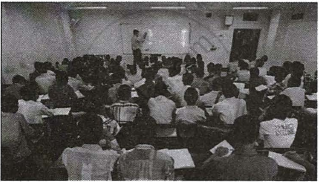Advertisements
Advertisements
प्रश्न
Find the values of k for which the system
2x + ky = 1
3x – 5y = 7
will have (i) a unique solution, and (ii) no solution. Is there a value of k for which the
system has infinitely many solutions?
उत्तर
The given system of equation may be written as
2x + ky - 1 = 0
3x – 5y - 7 = 0
It is of the form
`a_1x + b_1y + c_1 = 0`
`a_2x + b_2y + c_2 = 0`
where `a_1 = 2, b_1 = k, c_1 = -1`
And `a_2 = 3, b_2 = -5, c_2 = -7`
1) The given system will have a unique solution, if
`a_1/a_2 != b_1/b_2`
`=> 2/3 != k/(-5)`
`=> -10 != 3k`
`=> 3k != - 10`
`=> k != (-10)/3`
So, the given system of equations will have a unique solution if k = (-10)/3
2) The given system will have no solution, if
`a_1/a_2 - b_1/b_2 != c_1/c_2`
We have
`a_1/a_2 = b_1/b_2`
`=> 2/3 = k/(-5)`
`=> -10 = 3k`
=> 3k = -10
`=> k = (-10)/3`
We have
`b_1/b_2 = k/(-5) = (-10)/(3 xx -5) = 2/3`
And `c_1/c_2 = (-1)/(-7) = 1/7`
Clearly `b_1/b_2 != c_1/c_2`
So, the given system of equations will have no solution , if `k = (-10)/3`
For the given system to have infinite number of solutions, we must have
`a_1/a_2 = b_1/b_2 = c_1/c_2`
We have,
`a_1/a_2 = 2/3, b_1/b_2 = k/(-5)`
And `c_1/c_2 = (-1)/(-7) = 1/7`
Clearly `a_1/a_2 != c_1/c_2``
So, whatever be the value of k, we cannot have
`a_1/a_2 - b_1/b_2 = c_1/c_2`
Hence, there is no value of k, for which the given system of equations has infinitely many solutions
APPEARS IN
संबंधित प्रश्न
Find the value of k for which the following system of equations has a unique solution:
4x + ky + 8 = 0
2x + 2y + 2 = 0
Solve for x and y:
0.4x + 0.3y = 1.7, 0.7x – 0.2y = 0.8.
Solve for x and y:
23x - 29y = 98, 29x - 23y = 110
Solve for x and y:
`x/a - y/b = 0, ax + by = a^2 + b^2`
Solve for x and y:
6(ax + by) = 3a + 2b,
6(bx – ay) = 3b – 2a
Show that the following system of equations has a unique solution:
2x - 3y = 17,
4x + y = 13.
Also, find the solution of the given system of equations.
Find the value of k for which the system of equations has a unique solution:
x – ky = 2,
3x + 2y + 5=0.
Find a fraction which becomes `(1/2)` when 1 is subtracted from the numerator and 2 is added to the denominator, and the fraction becomes `(1/3)` when 7 is subtracted from the numerator and 2 is subtracted from the denominator.
Find the value(s) of p in (i) to (iv) and p and q in (v) for the following pair of equations:
2x + 3y = 7 and 2px + py = 28 – qy,
if the pair of equations have infinitely many solutions.
Read the following passage:
|
A coaching institute of Mathematics conducts classes in two batches I and II and fees for rich and poor children are different. In batch I, there are 20 poor and 5 rich children, whereas in batch II, there are 5 poor and 25 rich children. The total monthly collection of fees from batch I is ₹9,000 and from batch II is ₹26,000. Assume that each poor child pays ₹x per month and each rich child pays ₹y per month.
|
Based on the above information, answer the following questions:
- Represent the information given above in terms of x and y.
- Find the monthly fee paid by a poor child.
OR
Find the difference in the monthly fee paid by a poor child and a rich child. - If there are 10 poor and 20 rich children in batch II, what is the total monthly collection of fees from batch II?

